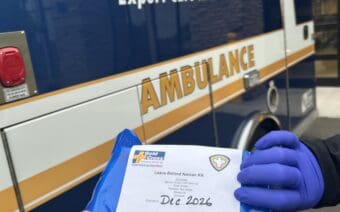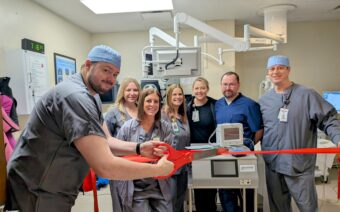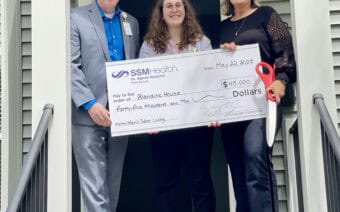
October 3, 2023
STURGEON BAY – The surgical suites at Door County Medical Center (DCMC) in Sturgeon Bay got what Gwen Haight, director of Perioperative Services, said were much needed upgrades the last several months.
“Before the upgrade, we were relatively integrated,” she said. “However, it was pretty outdated equipment. (The last time we) upgraded had been… nine years ago, maybe even already.”
When conversations about replacing the overhead lights in the surgical suites came up, Haight said DCMC decided to go to the drawing board and create a plan of upgrades for the suites as a whole, instead of only updating one puzzle piece.
“We had wanted to change out our overhead lights because they’re heavy and hard to move, and when a surgeon wants to pull them into place, a lightweight, easily movable light is easier on their body, as well as faster and smoother,” she said. “It morphed into this (idea of)… ‘what can we do and how could this help matters out.’”
The discussion, Haight said, also led to other upgrades, including:
The arms that hold the monitors, which provide a smoother, better range of motion Larger and additional screens to display all necessary information in one placeNew cameras that display the surgery in 3D
Except for the cameras, which Haight said will hopefully be up and running sometime this month at the latest, the process of upgrading the suites from beginning to end took about a year and a half to complete.
“We were truly at the mercy of supply chains,” she said. “We had like a six-month time frame before we could even get on the list to get the construction (process) going.”
Smoother for everyone
The upgrades, Haight said, will make the surgery process easier for everyone – from the surgeon, nurse and anesthesiologist to the patient.
For example, she said the additional screens will allow staff to display more information that will allow the physician to look at it in real-time versus having a nurse pull up the information.
“Also, our anesthesiologist can display all their vital signs and heart rhythms (on) a screen if they want to,” she said. “And, it might not seem like everybody needs to know the patient’s blood pressure and pulse, but all those things are important to the entire team, not just the anesthesiologist – they just happen to be in charge of it.”
When the screens aren’t in use, Haight said they can be used for the patients.
“We can put up calming, nice pictures,” she said. “We’ve offered to do a movie for a child… we (also) have nice overhead music now.”
On top of the medical equipment upgrades, Haight said the suites now have a small “hub” or control center, where the nurse has all the paperwork, their computer and can manage all the screens and technology from that spot.
“There’s less movement generated so it speeds everything up,” she said. “Everything is more at our fingertips.”
The up-to-date medical equipment makes an easy adjustment for new surgeons as well, because Haight said they are trained on all the latest equipment.
“It helps us attract qualified and quality surgeons as well, which our community needs and deserves,” she said.
While the patient may not feel a difference during the surgery itself, Haight said they will be able to see it through the speed of their surgery – and their hospital bill.
“Any time a surgeon has their work eased with one little thing they have to do… is a minute or two (given back),” she said. “And every additional minute under anesthesia is time we can give back to the patient. Even if you decrease the surgical case by eight minutes, it’s a big deal because that’s eight minutes less of anesthesia. It’s eight fewer minutes of a charge. I think the patient is truly the benefactor of all of it.”
Providing the best care possible
Haight said she feels the upgrades will further show the Door County community that DCMC has their best interest at heart.
“(As) a rural hospital, we could be looked at as like we don’t have the same thing that a larger metropolitan or tertiary platform would have,” she said. “But it puts us on the same platform as any big hospital. We have the same technology so patients can feel confident that if they come here, they’re going to have the same technology used by our surgeons as the surgeons in Green Bay and Milwaukee.”
Haight said she has spoken with members of other rural healthcare facilities across the state and feels “blessed and fortunate we can have all of this.”
“We’re probably more ahead of the game than behind the game on a lot of things,” she said. “I don’t think we need to be creating the wheel, but we sure can get on that wheel quickly if we feel it’s important for our patients – and our surgeons. They need a safe place to work, and then we can provide even safer and higher quality care for our patients.”
 ‘Growing’ into a new office location, company president
‘Growing’ into a new office location, company president For Johnson, ATHENA Leadership Award a shock, yet validating
For Johnson, ATHENA Leadership Award a shock, yet validating








